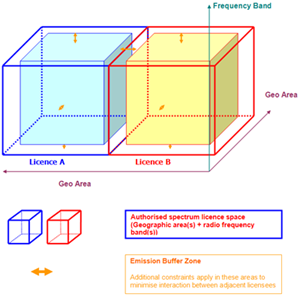What a spectrum licence lets you do
A spectrum licence lets you use a range of radiocommunications devices in a specific:
- geographic area
- frequency band.
Spectrum licences may be valid for up to 20 years.
We usually auction spectrum licences. Organisations consider them assets and can trade a spectrum licence.
Spectrum licences are different to:
Technical frameworks
Technical frameworks help us manage spectrum licences for each frequency band. Find out more about technical frameworks for spectrum licences.
How we give spectrum licences
We may give spectrum licences by:
- auction
- tender
- set price
- negotiation
- direct allocation.
We usually auction spectrum licences because demand exceeds supply. Auctions are also a simple, fair and transparent way to allocate spectrum.
We may use these auction methods:
- Simple clock auction (SCA)
An auction method we use where participants bid on 1 auction lot at a time. The lot will be for a specific frequency and geographic area. The auction manager names the price at the start of an auction round, and a bidder must meet this price to make it to the next round. If they make a lower bid, they can only win the auction if no one else bids higher. This is like an online equivalent of a traditional English open outcry auction. - Simultaneous multi-round ascending (SMRA)
An auction method where participants can bid on multiple lots at the same time. Each lot is a specific frequency and geography. The auction manager sets a starting price for each lot. Bidding takes place in multiple rounds. When no more bids are placed on any lot, the highest bidder for a lot wins that lot. - Enhanced simultaneous multi-round ascending (ESMRA)
An auction method we use that has two stages – an allocation and assignment stage. In the allocation stage, bidders express demand for the number of generic lots for each product on which they are bidding. When demand is less than or equal to supply in all products, then the winning bidders are allocated the lots in the products they won. In the assignment stage, bidders express their preference for a particular frequency range for the lots they won for each product in the allocation stage. Bidders pay the price per lot for each product allocated to them and a price for winning their frequency preference.
We may also use other auction methods. The method we choose depends on the spectrum we will auction.
When we plan an auction we will:
- publish a Notice to invite applications
- publish an applicant pack and other information on our website
- announce the auction via our ebulletin.
Find out more about spectrum auctions.
Rules for spectrum licences
If we give you a spectrum licence, you can decide if you will or won’t use it before it expires.
We don’t generally restrict the:
- technology you can use
- service you provide.
But we do restrict the maximum power your devices can give out.
These limits protect other licence holders that use spectrum near you.

Your licence will say the restrictions that apply to you.
If we give you a spectrum licence you must register every transmitter you plan to use, unless it is exempt.
The Radiocommunications Act 1992 (the Act) sets out the rules for spectrum licences.
You must know your obligations when we give you a spectrum licence.
Licence period
We give spectrum licences for up to 20 years. They do not renew automatically.
For spectrum licences without renewal statements, we will write to you and ask if you wish to renew it 5 years before your licence expires.
For spectrum licences with renewal statements, the renewal statements state:
- whether the licence can be renewed
- the renewal application period
- the renewal decision-making period.
We will tell you our decision, and let the public know that the licence will expire soon.
We may do this through:
- our website
- our offices
- the Commonwealth Gazette.
People who want a spectrum licence can register their interest in response to our invitation (notice).
Further information about our approach to renewal of spectrum licences is available in Our approach to radcomms licensing and allocation information paper.
Why we may suspend or cancel your spectrum licence
We may suspend your spectrum licence if you or someone who uses your licence:
- breaks the rules
- uses a device in an illegal way
- uses a device to break the law.
If we decide to suspend your licence, we will write to you and explain why.
A suspension lasts for 28 days unless we take legal action or cancel the suspension.
Other people who are affected by your actions may also take legal action.
If we cancel your spectrum licence, you can ask us to review the decision.
You can only use your licence again if we agree.
Fees
Fees help us cover the cost to manage spectrum.
There are 3 types of fees for spectrum licences:
- spectrum access charges: what you pay to get a spectrum licence
- spectrum licence taxes: a yearly tax to cover the cost to manage spectrum
- service charges: fees for certain services.
There may be other fees, such as a fee to take part in an auction.
Band specific access charge determinations
You must pay your licence fees to keep your spectrum licence.
Find out more about spectrum licence taxes.
